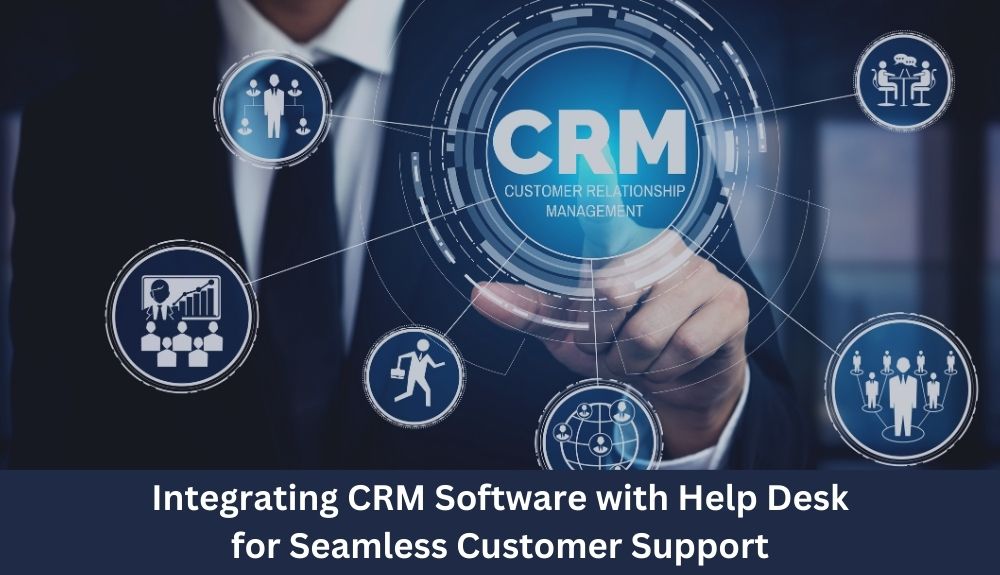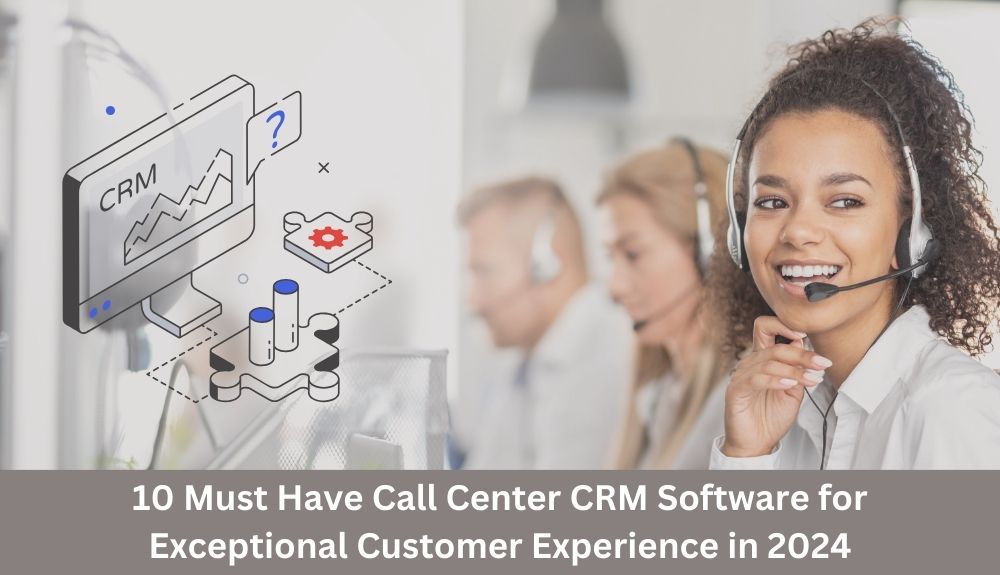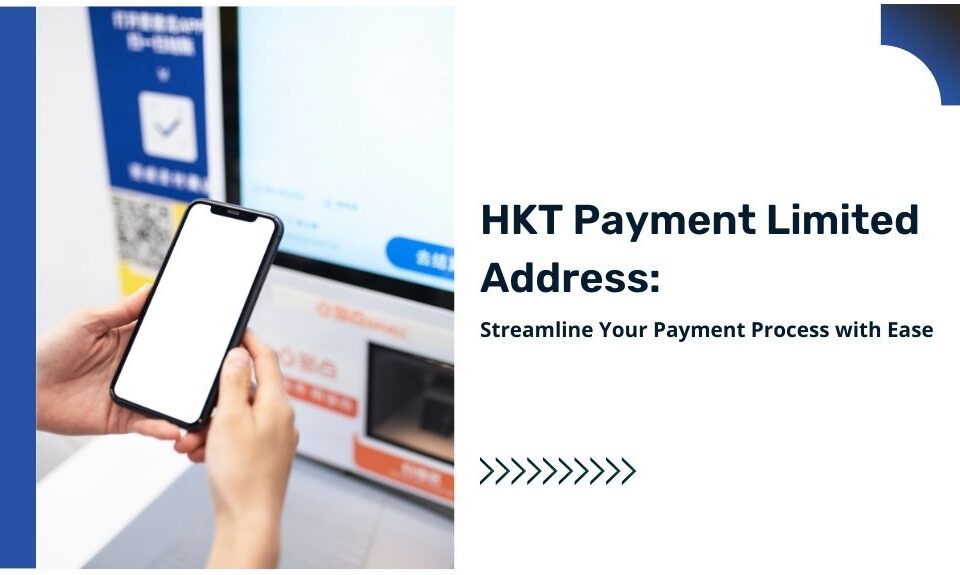10 Must Have Call Center CRM Software for Exceptional Customer Experience in 2024

Supercharge Your Restaurant’s Performance: The Benefits of Optimizing Your Point of Sale System
November 29, 2023
How to Create the Perfect Retail Gift Guide for the Holiday Season
December 2, 2023Are you tired of struggling to provide exceptional customer experiences? Do you ever wish there was a way to streamline your call center operations and boost customer satisfaction? Look no further! In this blog, we will delve into the world of Call Center CRM Software and reveal the top 10 must-have solutions for achieving extraordinary customer experiences in 2024.
1. What is Call Center CRM Software?
Call Center CRM software is a specialized tool designed to streamline and enhance the customer experience for call centers. It combines the functionalities of a traditional Customer Relationship Management (CRM) system with features catered specifically to call center operations.
a. Definition of Call Center CRM Software:
Call Center CRM software refers to a comprehensive system that enables call centers to efficiently manage customer interactions, track customer information, and provide personalized support across multiple communication channels.
b. Importance of Call Center CRM Software:
Implementing Call Center CRM software is crucial for call centers to effectively handle the high volume of inbound and outbound customer calls. By centralizing customer data and automating various processes, it allows agents to deliver exceptional customer service, improve efficiency, and boost customer satisfaction.
c. Key Features of Call Center CRM Software:
1) Inbound Call Center Management: This feature enables agents to receive and handle incoming calls efficiently, ensuring prompt and satisfactory resolutions.
2) Outbound Call Center Management: With this feature, call centers can handle outbound calls for sales or proactive customer outreach, ensuring they maintain strong customer relationships.
3) Omnichannel Customer Experience: Call Center CRM software provides seamless integration across multiple communication channels such as phone calls, live chat, email, social media, and more, offering customers a consistent and personalized experience.
4) Interactive Voice Response (IVR): IVR technology allows customers to navigate through menu options using voice or touch-tone inputs, enabling them to self-serve and reach the right agent quickly.
5) Call Routing: This feature ensures that incoming calls are efficiently directed to appropriate agents or departments based on predefined rules, improving response times and customer satisfaction.
6) Call Recording: Call Center CRM software provides the capability to record and store customer interactions for quality assurance, training, and dispute resolution purposes.
d. Quotes:
“Call Center CRM software is the backbone of any call center operation, enabling agents to provide exceptional customer service and build lasting relationships.” Industry Expert
“With the right call center CRM software, companies can streamline their customer support processes, enhance agent productivity, and ultimately boost customer satisfaction.” CRM Software Company Representative
💡 key Takeaway: Call Center CRM software is a comprehensive solution that enhances customer support and streamlines call center operations by combining the functionalities of a CRM system with features tailored specifically to call centers.
2. Importance of CRM Software in Call Centers
Today, call centers are at the forefront of customer support and play a crucial role in delivering exceptional customer experiences. To achieve this, having an effective CRM (Customer Relationship Management) software is of utmost importance. Call center CRM software not only streamlines and enhances customer interactions but also improves overall operational efficiency. Let’s explore the key reasons why CRM software is essential in call center operations.
1. Centralized Customer Information:
A robust CRM system provides call center agents with a centralized database of customer information. This includes contact details, interaction history, purchase history, and any previous issues or inquiries raised. With all relevant data readily available, agents can provide personalized and tailored service to each customer, resulting in improved customer satisfaction.
2. Seamless Omnichannel Experience:
In today’s digital age, customers expect seamless interactions across multiple channels. CRM software integrates various communication channels such as phone calls, live chat, social media, email, and more into a single platform. This integration enables agents to handle customer interactions seamlessly, ensuring a consistent experience regardless of the channel chosen by the customer.
3. Efficient Call Routing:
CRM software enables intelligent call routing, ensuring that each incoming call is directed to the most suitable agent based on factors such as skillset, expertise, or language proficiency. This feature minimizes wait times for customers, as their calls are efficiently routed to agents who can address their specific needs.
4. Enhanced Productivity:
With CRM software, call center agents can access comprehensive customer profiles, call histories, and interaction logs with just a few clicks. This quick access to information eliminates the need for extensive searching or switching between multiple systems, allowing agents to handle inquiries quickly and efficiently. This efficiency translates to higher productivity and shorter resolution times.
5. Improved Analytics and Reporting:
CRM software provides valuable insights into call center operations through robust analytics and reporting features. Managers can analyze call volumes, average handling times, customer satisfaction scores, and other metrics to identify areas for improvement and make data-driven decisions. These insights enable call centers to optimize their processes, allocate resources effectively, and continuously enhance the customer experience.
3. Key Features to Look for in Call Center CRM Software
When it comes to choosing the right CRM software for your call center, it’s important to consider the key features that will help you deliver an exceptional customer experience. Here are three essential features to look for:
1. Interactive Voice Response (IVR) System:
An IVR system is a critical feature for any call center CRM software. It allows customers to interact with an automated voice menu and route their inquiries to the appropriate department or agent. This feature streamlines the customer journey, reduces wait times, and improves overall efficiency.
2. Omnichannel Customer Experience:
In today’s digital world, customers expect seamless interactions across multiple channels. Look for a call center CRM software that supports an omnichannel approach, enabling integration with various communication channels such as phone calls, live chat, email, and social media. This ensures that customer interactions are consistent and unified regardless of the channel, leading to enhanced customer satisfaction and loyalty.
3. Advanced Analytics and Reporting:
Tracking and analyzing key metrics is crucial for optimizing call center performance. Make sure the CRM software offers robust analytics and reporting capabilities that provide insights into call volumes, response times, customer satisfaction ratings, and agent performance. With these data-driven insights, you can identify areas for improvement, implement effective strategies, and continuously enhance the customer experience.
💡 key Takeaway: When choosing a call center CRM software, prioritize key features such as Interactive Voice Response (IVR) system, omnichannel customer experience, and advanced analytics and reporting to ensure exceptional customer experience and operational efficiency.
4. Enhancing Customer Experience with Call Center CRM Software

Customer experience is a top priority for businesses, especially call centers that rely on providing exceptional customer support. In today’s competitive landscape, having the right tools and software is crucial to deliver a seamless and satisfying experience to every customer interaction. This is where Call Center CRM software comes into play, as it offers a comprehensive solution to manage customer relationships effectively and optimize the customer journey.
Here are some key ways that Call Center CRM software can enhance the customer experience:
1. Centralized Customer Information: Utilizing a call center CRM software allows agents to access a centralized database that contains all customer information. This eliminates the need for agents to switch between different systems, ensuring quick and efficient access to relevant data during customer interactions. With a complete view of customer history, agents can personalize conversations, resolve issues faster, and leave customers feeling valued and understood.
2. Streamlined Communication Channels: Call center CRM software integrates multiple communication channels such as phone calls, emails, live chat, and social media into a single platform. This omnichannel approach enables agents to engage with customers seamlessly across various channels, providing a consistent experience and ensuring that no customer inquiry falls through the cracks. Customers appreciate the flexibility and convenience of reaching out through their preferred communication method, leading to higher satisfaction rates.
3. Automated Call Routing: With advanced call routing capabilities, Call Center CRM software can intelligently distribute incoming calls to the most suitable agent based on skills, availability, or other predefined criteria. This ensures that customers are connected to the right resource promptly, minimizing wait times and enhancing first-call resolution. Customers value efficient call routing as it saves time and enables them to receive the assistance they need without unnecessary transfers or delays.
4. Interactive Voice Response (IVR) System: IVR systems integrated into Call Center CRM software allow customers to navigate through self-service menus to find the information they need or perform specific tasks without human intervention. By automating routine inquiries and transactions, customers are empowered to get immediate assistance at any time, enhancing convenience and reducing the need for agent intervention. This creates a smoother customer experience and reduces the pressure on agents to handle high call volumes.
💡 key Takeaway: Utilizing Call Center CRM software can significantly enhance the customer experience by providing agents with centralized customer information, streamlining communication channels, implementing automated call routing, and incorporating interactive voice response systems. These features contribute to increased customer satisfaction, improved efficiency, and better overall customer service delivery.
5. Benefits of Using Inbound Call Center CRM Software
Inbound call center CRM software is a crucial tool for businesses looking to enhance their customer experience. It offers a wide range of benefits that can greatly improve the efficiency and effectiveness of customer interactions. Let’s explore some of the key advantages of using inbound call center CRM software:
1. Streamlined Customer Interactions:
With inbound call center CRM software, businesses can efficiently manage and handle customer interactions on a single platform. This streamlines the process and ensures that all customer inquiries and issues are properly addressed.
Quote: “Inbound call center CRM software allows businesses to have a centralized repository of customer information, making it easier for agents to access customer data and provide personalized service.” CRM Expert
2. Enhanced Customer Data Management:
Inbound call center CRM software enables businesses to capture, store, and analyze valuable customer data. This information can be used to gain insights into customer behavior, preferences, and needs, allowing businesses to tailor their services accordingly.
Key features of inbound call center CRM software for enhanced customer data management:
Advanced contact management
Detailed call logging and recording
Integration with customer relationship management (CRM) systems
Quote: “Inbound call center CRM software empowers businesses with a comprehensive view of customer interactions, allowing them to deliver personalized experiences and build stronger relationships.” Customer Service Specialist
3. Efficient Call Routing:
Inbound call center CRM software incorporates intelligent call routing capabilities, ensuring that incoming calls are directed to the most suitable agents or departments. This leads to quicker resolutions and improved customer satisfaction.
Key features of inbound call center CRM software for efficient call routing:
Interactive voice response (IVR) systems
Automatic call distribution (ACD)
Skills-based routing
Quote: “Efficient call routing provided by inbound call center CRM software ensures that customers are connected to the right agents, minimizing wait times and maximizing first-call resolutions.” Contact Center Manager
4. Omnichannel Customer Experience:
Inbound call center CRM software facilitates seamless communication across multiple channels, such as phone calls, live chat, email, and social media. This enables businesses to offer a consistent and personalized omnichannel customer experience.
Key features of inbound call center CRM software for an omnichannel customer experience:
Integration with various communication channels
Unified customer interaction history
6. Optimizing Outbound Call Center Operations with CRM Software
Outbound call center operations play a crucial role in customer engagement and driving business growth. To maximize the effectiveness and efficiency of outbound calling campaigns, call center managers need the right tools in place. This is where CRM software comes into play. By leveraging the power of CRM software, outbound call centers can streamline their operations, enhance productivity, and achieve higher levels of customer satisfaction.
Key Features of CRM Software for Outbound Call Centers:
1. Comprehensive Customer Interaction Tracking: A robust CRM system allows outbound call centers to track every interaction with customers. This enables agents to access detailed information about previous conversations, ensuring personalized and context-rich conversations with each customer.
2. Call Routing and Dialing Capabilities: CRM software simplifies the outbound dialing process by automatically routing calls to available agents. Smart dialers further optimize efficiency by automatically dialing the next available number, eliminating manual dialing and reducing agent idle time.
3. Integrated Customer Database: CRM software provides a centralized customer database, where outbound call center agents can access all customer information in one place. This includes contact details, purchase history, preferences, and any previous interactions, enabling agents to offer personalized and tailored solutions.
4. Advanced Reporting and Analytics: CRM systems offer comprehensive reporting and analytics capabilities that allow call center managers to monitor the performance of outbound campaigns. They can track key metrics like call duration, conversion rates, and revenue generated to identify areas for improvement and make data-driven decisions.
5. Email and Social Media Integration: CRM software with email and social media integration enables outbound call center agents to reach out to customers through multiple channels. This ensures a seamless omnichannel customer experience, where agents can engage with customers via their preferred communication platform.
6. Automated Follow-ups and Reminders: CRM software automates follow-up tasks and reminders, ensuring that outbound call center agents stay on top of their scheduled callbacks. This helps to improve efficiency and ensures that no customer is left waiting for a promised follow-up.
7. Training and Coaching Resources: Some CRM software solutions offer training and coaching resources to help outbound call center agents improve their skills. This includes call recording and monitoring features, allowing supervisors to provide feedback and guidance for continuous performance improvement.
💡 key Takeaway: Implementing CRM software in outbound call center operations can significantly enhance productivity, efficiency, and customer satisfaction. By utilizing the key features mentioned above, call center managers can maximize the potential of outbound campaigns and drive positive results.
7. The Role of CRM Software in Multichannel Customer Experience
In today’s interconnected world, customer interactions occur across multiple channels such as phone calls, emails, social media, and live chat. To manage these interactions effectively and provide exceptional customer experience, call center CRM software plays a crucial role. It serves as a central hub, consolidating customer information and enabling seamless communication across channels. Let’s explore the key benefits and features of CRM software in enabling a multichannel customer experience.
1. Centralized Customer Data Management:
CRM software allows call center agents to store and access all customer information in a single platform.
It consolidates data from various touchpoints, providing a comprehensive view of each customer’s interaction history.
2. Integration with Multiple Channels:
CRM systems integrate with various communication channels, including phone calls, emails, live chat, and social media platforms.
This integration enables agents to interact with customers seamlessly across different channels, ensuring consistent and personalized service.
3. Omnichannel Customer Experience:
CRM software enables an omnichannel customer experience by synchronizing customer interactions across all channels.
Agents can track customer history and preferences, allowing them to provide a personalized experience regardless of the communication channel.
4. Efficient Call Routing:
CRM systems offer advanced call routing capabilities, ensuring that customers are connected to the right agent with the appropriate skills and knowledge.
This feature minimizes wait times and improves first-call resolution, leading to higher customer satisfaction.
5. Interactive Voice Response (IVR) Integration:
CRM software can integrate with IVR systems, automating certain customer interactions and routing calls based on predefined criteria.
IVR integration improves call handling efficiency and reduces the need for manual intervention.
6. Comprehensive Reporting and Analytics:
CRM systems provide extensive reporting and analytics capabilities, allowing managers to gain insights into call center operations and customer interactions.
These insights help identify areas for improvement, optimize agent performance, and enhance overall customer experience.
💡 key Takeaway: CRM software plays a central role in managing customer interactions across multiple channels and enables call center agents to provide personalized and efficient service. By consolidating customer data, integrating with various communication channels, and offering advanced features like call routing and IVR integration, CRM software empowers call centers to deliver exceptional multichannel customer experiences.
8. Integrating CRM Software with Help Desk for Seamless Customer Support

In the ever-evolving landscape of customer support, the integration of CRM software with a help desk has become a vital element for call centers. This powerful combination empowers businesses to provide exceptional customer service and elevate the overall customer experience. Here, we will explore the key advantages and features of integrating CRM software with a help desk.
1. Streamlined Customer Interaction
By integrating CRM software with a help desk, call center agents can access all relevant customer information in one centralized location. This eliminates the need to toggle between multiple platforms, saving time and allowing agents to focus on providing personalized and effective customer support.
2. Enhanced Customer Data Management
A CRM system integrated with a help desk enables call centers to efficiently manage customer data. Agents can easily update customer profiles, track customer interactions, and view past support tickets, ensuring a comprehensive understanding of each customer’s history and needs. This valuable data allows agents to deliver highly targeted and tailored support.
3. Efficient Ticket Management
Integrating CRM software with a help desk creates a seamless ticket management process. Agents can log, track, and prioritize support tickets directly within the CRM system. This centralized approach helps agents stay organized, ensures prompt responses to customer queries, and improves overall ticket resolution times.
4. Omnichannel Customer Experience
With CRM software integrated into a help desk, call centers can provide a seamless omnichannel customer experience. Whether customers reach out via phone calls, live chat, social media, or email, all interactions and data are logged and accessible within the CRM system. This holistic view allows agents to deliver consistent support across multiple communication channels, ensuring a cohesive and satisfactory experience for customers.
5. Advanced Reporting and Analytics
The integration of CRM software with a help desk allows call centers to leverage advanced reporting and analytics features. Agents can generate detailed reports on key metrics such as call volume, customer satisfaction ratings, and average response times. These insights enable call centers to identify areas for improvement, make data-driven decisions, and further optimize their customer support processes.
💡 key Takeaway: Integrating CRM software with a help desk streamlines customer interaction, enhances data management, improves ticket handling, enables omnichannel support, and provides advanced reporting capabilities. This integration is a must-have for call centers aiming to deliver exceptional customer support and elevate the overall customer experience.
9. Maximizing Efficiency with CRM Software: Best Practices
In today’s highly competitive business landscape, call center operations are becoming increasingly complex. To stay ahead in the game and deliver exceptional customer experience, call centers need to leverage the power of cutting-edge CRM software. Here are some best practices to maximize efficiency with CRM software:
1. Centralized Customer Data: One of the key features of CRM software is its ability to centralize customer data. By storing all relevant information in a single platform, call center agents can access customer details, interaction history, and previous tickets. This enables agents to provide personalized and efficient service, saving both time and effort.
2. Implement Omni Channel Support: Customers now expect seamless support across various channels, such as phone calls, emails, live chat, social media, and more. With CRM software, call centers can integrate all these channels into a unified platform, ensuring a consistent and personalized omnichannel customer experience. Agents can easily switch between channels, providing faster response times and improving overall customer satisfaction.
3. Utilize Interactive Voice Response (IVR): Interactive Voice Response is an advanced feature of CRM software that allows customers to navigate through a menu using voice or touch-tone commands. IVR systems can handle routine inquiries, gather relevant information, and direct calls to the appropriate department or agent. This streamlines the call routing process, reduces customer wait times, and improves overall call center efficiency.
4. Enable Call Recording: Call recording is an invaluable tool for training, quality assurance, and dispute resolution. CRM software with unlimited call recording capabilities ensures that important customer interactions can be revisited and analyzed for improvement. Managers can listen to recorded calls to evaluate agent performance, identify areas for improvement, and maintain high-quality customer service standards.
5. Automate Routine Tasks: CRM software offers automation capabilities to streamline repetitive and time-consuming tasks. By automating processes such as ticket creation, data entry, and follow-up emails, call center agents can focus on high-value interactions and complex customer issues. This not only improves efficiency but also enhances the overall customer experience.
6. Optimize Call Routing: CRM software allows call centers to set up intelligent call routing based on various criteria, such as agent availability, skillset, language proficiency, or customer priority. By routing incoming calls to the most appropriate agent, call centers can reduce call transfer rates, lower customer frustration, and ensure faster issue resolution.
10. Top 10 Call Center CRM Software for Exceptional Customer Experience in 2024
When it comes to providing exceptional customer experience, having the right call center CRM software is crucial. These tools not only streamline your call center operations but also enhance customer support, satisfaction, and overall efficiency. In this section, we will explore the top 10 call center CRM software options for 2024 that can take your customer experience to the next level.
1. Customer Relationship Management (CRM) Systems:
With a comprehensive CRM system, you can manage all customer interactions and data in a single platform. These systems provide a holistic view of customer history, enabling your agents to deliver personalized and efficient support. Key features to look for include easy integration with other tools, customizable dashboards, and advanced reporting capabilities.
“As a call center manager, having a CRM system that allows me to track and analyze customer interactions has significantly improved our customer experience.” John, Call Center Manager.
2. Interactive Voice Response (IVR) Systems:
IVR systems automated call routing and handle customer queries using pre-recorded voice prompts. This interactive system allows callers to navigate through options and reach the right department or agent quickly. Look for IVR systems with intelligent routing, personalized greetings, and multilingual support to enhance customer satisfaction.
“Implementing an IVR system has reduced our call wait times and improved customer satisfaction rates.” Sarah, Customer Support Supervisor.
3. Live Chat Software:
Live chat enables real-time communication between agents and customers, offering instant support and quick issue resolution. Look for live chat software that offers features like proactive chat invitations, canned responses, file transfers, and chat history for a seamless customer experience.
“Adding live chat to our call center software has significantly improved our response times and customer satisfaction.” Lisa, Call Center Team Lead.
4. Omnichannel Customer Experience:
Customers expect seamless service across multiple channels, including phone calls, emails, social media, and live chat. Investing in call center CRM software that supports an omnichannel approach ensures consistent customer experiences and efficient agent handling across all platforms.
“Providing an omnichannel experience has strengthened our customer relationships and improved overall brand loyalty.” Mark, Customer Experience Manager.
5. Call Recording and Monitoring:
Call recording and monitoring functionalities enable supervisors to review agent performance, identify training opportunities, and ensure quality service delivery. Look for software that offers unlimited call recording, real-time monitoring, and advanced analytics for actionable insights.
Conclusion
In conclusion, implementing the right call center CRM software in your organization is crucial to deliver an exceptional customer experience in 2024 and beyond. By utilizing the features and capabilities of these top 10 CRM software, you can streamline your customer interactions, boost agent productivity, and gain valuable insights for strategic decision-making. With the rapid advancement of technology, staying up to date with the latest CRM trends is key to staying ahead of the competition. The software mentioned in this blog are constantly evolving and being updated to meet the changing needs of businesses in the customer service industry. To ensure you choose the best CRM software for your call center, consider your requirements, budget, and scalability.




